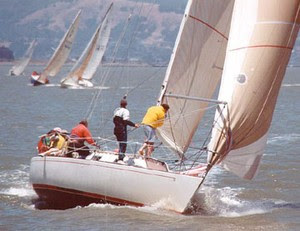According to Sailing Magazine,
Three sailors died and a fourth crewmember was treated for hypothermia when the J/35 they were on smashed into a breakwall during a man overboard rescue in Chicago, Illinois, October 24.It was reportedly rough lake conditions with choppy waters that evening, the NOAA buoy in the middle of southern Lake Michigan (NDBC 45007) reported north winds from 21 to 30 knots and waves 7-9 feet high. The owner of the 35 feet J/35 sailboat "Jason" along with his three close friends decided to take the trip. They are all experienced sailors and they were all wearing life jackets. they left Columbia Yacht Club in downtown Chicago to take the boat to Crowley's Yacht Yard up the Calumet River some 12 nautical miles away.
The accident happened at about 8:15 p.m. near the end of a short trip to a local boatyard for the winter.
According to Chicago Tribune, reported by Mary Owen, Jason Meisner, and Angela Rozas on October 25, 2007, the planned trip of Jason had almost made it,
. . . before the crew attempted to take down the sails close to a breakwall. Childers, of Evanston, fell overboard. The remaining crew radioed for help. The three men tried to circle and rescue Childers, but officials believe 10-foot waves slammed the boat into the cement and rock breakwall, throwing everyone overboard and smashing the boat into pieces. Rescuers from the Coast Guard, Chicago Marine Unit and a tugboat converged on the scene. They had trouble finding the crew in the choppy water. But then a wave crashed onto a rescue boat, shining its light onto the breakwall, where the men were splayed on the rocks, rescuers said Thursday.The Coast Guard rescued all four men within 45 minutes but unfortunately only one survived. Killed were the sailboat’s owner John Finn, 45, Alexander Childers, 38, and Adam Kronen, 33. The survived crew member, Joseph Sunshine, 34, was treated at an area hospital.
 Here's a picture of the sailboat similar to the one that was lost. According to local Coast Guard
Here's a picture of the sailboat similar to the one that was lost. According to local Coast Guardofficers that two mistakes caused this tragedy. First, they sent a man onto the foredeck without a harness, and secondly they took their sails down, when the sails could have made the difference in keeping them off the breakwall which destroyed the boat.
I have been strongly advocating wearing life jacket at all times, clearly that's not at all enough. Harness should also be required on deck on all boats, large or small, at all times. I think if it is at all possible, harnesses should also be provided around nearshore beach areas where nearshore freaque waves can occur at any time suddenly without warning.





























